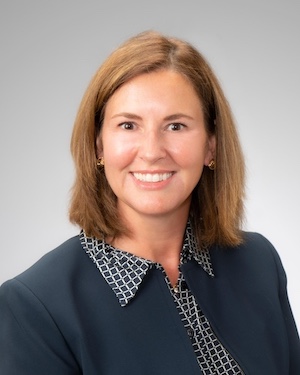Greene is New Chief of Pediatric Neurosurgery
Stephanie Greene, MD, a nationally recognized expert in pediatric vascular neurosurgery and congenital neurosurgical disorders, was named chief of pediatric neurosurgery and professor of neurosurgery and pediatrics in the Duke Department of Neurosurgery in April 2024.
As division chief, she succeeds Herb Fuchs, MD, PhD, who is stepping down from his duties as chief after 32 years of devoted service, but who will continue to practice.
Dr. Greene was recruited to Duke from the University of Pittsburgh School of Medicine,
where she practiced for fifteen years. She was professor of neurological surgery and vice chair for education in the department of neurological surgery. She was the director of vascular and perinatal neurosurgery at Children’s Hospital of Pittsburgh, where she was also co-director and founder of the Neurovascular Center of Excellence. She was the fellowship director and site residency director at Children's Hospital of Pittsburgh, as well. Prior to practicing in Pittsburgh, she was chief of pediatric neurosurgery at Hasbro Children's Hospital, affiliated with Brown Medical School.

Equitable Access to Pediatric Brain Tumor Care
A collaborative effort between The Preston Robert Tisch Brain Tumor Center and Duke Children’s Hospital removes traditional systemic barriers for families to access complex pediatric brain tumor treatment. As a result, children and families worldwide have access to potentially life-saving care at Duke.
“The first step is getting kids to us,” says David M. Ashley, PhD, FRACP, MBBS (Hons), pediatric neuro-oncologist and director of The Preston Robert Tisch Brain Tumor Center. “Money and geography shouldn’t be barriers for any child to receive timely treatment — so we created a program that provides families with financial resources and support to get the care they need.”
Once at Duke, children have access to innovative clinical trials and expert pediatric neurosurgery and neuro-oncology teams equipped to diagnose and manage advanced pediatric brain tumor cases.
“We’re successfully treating brain and spinal cord tumors in children and young adults, using the most innovative surgical and oncologic approaches ,” says Gerald A. Grant, MD, pediatric neurosurgeon and chair of the Department of Neurosurgery.
Supported by the generous philanthropy of the Business Executive Committee of The Preston Robert Tisch Brain Tumor Center, Ashley and his team established Destination Hope. In just a few years, the program has helped over 250 families cover the cost of travel, lodging, and clinical care.

Multidisciplinary Care for Chiari Malformation
Interdisciplinary expertise is essential to manage the comprehensive care of patients with Chiari malformation and syringomyelia. At Duke, the collaborative team includes neurosurgeons, neurologists who specialize in sleep issues, neuro-ophthalmologists, neuroradiologists, interventional radiologists who manage cerebrospinal fluid leaks, pain management specialists, and psychologists. Working as a team is essential to provide the individualized care and offer the best options to maximize quality of life.
Recognized Expertise
Duke’s Chiari malformation program is one of a handful in the U.S. that combines a team approach, comprehensive care, and nationally recognized expertise to offer the highest-quality care. From diagnosis to treatment, patients receive care from specialists who are contributing to the global understanding of Chiari malformation.
Improving Chiari Malformation Care
Duke researchers share knowledge and work to improve treatment for Chiari malformation. Duke geneticists were funded by the National Institutes of Health to investigate hereditary factors of type I Chiari malformations. Duke faculty also participate in national societies, foundations, and clinical research to better educate, diagnose, and treat people with this condition.
Year in Review Chapters
HOME / BRAIN TUMOR / CEREBROVASCULAR AND SKULL BASE / FUNCTIONAL / SPINE / PEDIATRIC / BRAIN AND SPINE METASTASIS / TRAUMA / GLOBAL / TOP PAPERS / RESIDENT HONORS